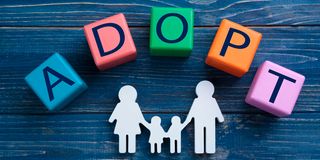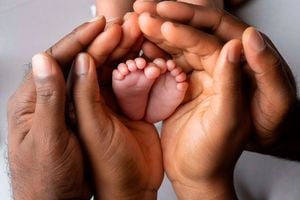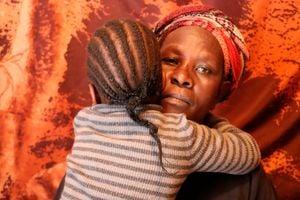
Each and every child resident in Kenya can be adopted.
The girl left the courtroom with a new parent and a new name. The date was May 4, 2022, and the setting was the Milimani Law Courts in Nairobi. This girl who had been abandoned in Ongata Rongai in 2020 was now starting a new life. Her sad past was now a closed chapter.
Her new parent, as confirmed by the court, was this female civil servant who had one biological daughter and an adopted son.
“She (the new mother) believes it is the best gift she can give as her service to humanity,” said the court.
Before the order was made, the girl had lived in their two-bedroom house with the woman and her two children for a while. Living with the minor is a requirement in law before adoption is done.
The outcome of that court verdict was that she belonged to that home forever. In fact, as per the Children Act, she is entitled to an inheritance as if she were the woman’s biological child.
There was another interesting order by the court — it fixed her date of birth for May 18, 2020, as there was no other way of telling when she was born.
That was one example of an adoption under Kenyan law, presided over by the High Court as the statutes anticipate. An often misunderstood procedure by Kenyans, which is also wrought in misconceptions, adoption is one of those topics that are hardly discussed.
Ms Juliet Wanjiru Muriuki, an associate at RW Mbaya and Company Advocates – one of the top firms on matters of adoption and has also studied the Children Act – shares with Parenting insights on what it takes to adopt a child in Kenya.
No, you cannot pick for yourself a child to adopt
Many think that anyone can walk into a children’s home and pick a child who impresses them to adopt. Unless the child is a relative, the choice is supervised by an adoption agency.
“An applicant shall not preselect a prospective adoptive child,” says the Children Act.
The Act gives two exceptions: in the case of kinship adoption (where a relative assumes parental responsibilities over a child); and where the applicant is a foster parent seeking to adopt a fostered child under his or her care.
Ms Wanjiru says in place of arbitrary selection, matching is done. It more or less resembles the operation of dating apps where a photo is the first point of contact.
“What social workers from the adoption societies do is to use photographs for matching purposes. They show you these photographs and then you can decide if you are ok with everything,” she says.
A person who wants to adopt describes the kind of child they want and society goes on a search for a child who meets such qualities.
“Sometimes you even find someone from Nairobi is matched with a child who is in Nyeri,” she explains.
Parenting is aware of complaints from some Kenyans who have gone through the process that they are sometimes given children far from what they would have preferred.
However, the lawyer notes that the adoption society is supposed to disclose everything about the child’s condition to the prospective adoptive parent to make an informed decision.
“If this is the only child with some of the requirements you want, they should disclose this to you so that now you can make an informed decision,” she says.
You’re a single man who wants to adopt a non-relative? Forget about it
Due to an amendment in the Children Act that came into effect in July 2022, an unmarried man cannot adopt a child, male or female, unless it is a blood relative.
“The court shall not make an adoption order in favour of a sole male applicant unless the applicant is a blood relative of the child,” reads the Act.
Before the 2022 amendment, men could only adopt boys. That path was also shut.
This provision has been fought from various quarters, with some terming it discriminatory. In December, the Majority Leader in the National Assembly, Mr Kimani Ichungw’ah, introduced a Bill seeking to do away with that provision.
In Ms Wanjiru’s view, there are good intentions behind the provision — whose framers sought to arrest sexual abuse of children.
“The Act is not saying that all males may be abusive to children. No; it’s the few that do it that have (led to this decision). It’s better to be safe than sorry,” she says.
Another provision seeking to check the exploitation of adopted children is that whoever is adopting a non-relative has to be at least 21 years older than the child.
“The age gap has to be 21 years so that you can find a parent that’s mature and well suited to adopt,” says Ms Wanjiru.
The person adopting also needs to be at least 25 years of age and no older than 65. However, Ms Wanjiru says the court can exercise discretion on the 65 years cap.
“The court, given the circumstances, can do away with this requirement,” she says.
“Let’s say it’s just a person who is capable of taking care of this child and it is in the best interest for this child to be adopted by an individual who’s 65 years old or older. You’ll apply to the court and then it will consider your circumstances and decide whether or not to allow this adoption.”
Equally, a child who qualifies for adoption should be between six months of age and 17 years.
When it’s a foreigner
According to the Children Act, an applicant who is not Kenyan cannot be allowed to adopt a child unless he or she is a blood relative of the minor.
However, if it is a foreigner married to a Kenyan, Ms Wanjiru says it will rest on the discretion of the judge handling the matter.
“If this foreigner has been married (to the Kenyan) for some time, he has bonded with this child, and it is in the best interest of this child for them to be legally adopted by this foreigner, then the court can allow such an adoption,” says the advocate.
A child above 10 has to approve of adoption in writing
In an adoption given the green light by the High Court in Milimani in August 2023, a judge allowed an uncle and an aunt, who were based in Canada, to adopt their 17-year-old nephew who was based in Kenya. The one notable component of the court proceedings was that the child had to consent to the adoption in writing.
“The minor consented via letter dated February 6, 2023,” the court noted.
The Children Act says in the case of a child who has attained the age of 10 years, the child has to give consent in writing.
If a parent shows up after adoption, custody can change
A new dispensation on adoption was introduced by the 2022 law change whereby courts were given powers to revisit adoptions if parents of an adopted child later resurface.
“Let’s say this child had been lost or abducted and this parent ensured that they followed all their steps and procedures. They reported this child was missing and investigations were done. They did not find this child at that time. But at this particular point, they’ve been able to identify their child who was lost or abducted. Then now it happens that the child has gone through adoption and it has been finalised,” explains the lawyer.
In such a case, a court can be moved to switch the custody of the child from the adoptive parents to the biological or order joint custody between the two parties.










